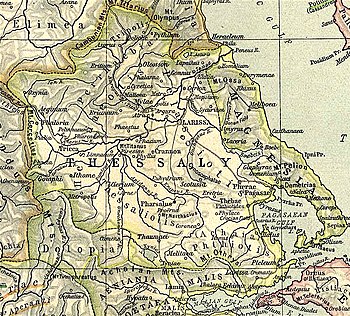Azorus
Coordinates: 39°59′09″N 22°04′57″E / 39.98591°N 22.08256°E

Azorus or Azoros (Ancient Greek: Ἄζωρος or Ἀζώριον[1]) was a town and polis (city-state)[2] in Perrhaebia in ancient Thessaly situated at the foot of Mount Olympus. Azorus, with the two neighbouring towns of Pythium and Doliche, formed a Tripolis.[3]
During the Roman–Seleucid War, the Tripolis was ravaged by an army of the Aetolian League in the year 191 BCE.[4] During the Third Macedonian War the three towns surrendered to the army of Perseus of Macedon in the year 171 BCE,[5] but that same year the Romans reconquered the three.[6] In the year 169 BCE troops arrived from the Roman consul Quintus Marcius Philippus who camped between Azorus and Doliche.[7][8]
The three cities minted a common coin with the inscription "ΤΡΙΠΟΛΙΤΑΝ".[9]
The site of Azorus is the palaiokastro (old fort) at the modern village of Azoros.[10][11]
References[]
- ^ Ptolemy. The Geography. 3.13.42.
- ^ Mogens Herman Hansen & Thomas Heine Nielsen (2004). "Thessaly and Adjacent Regions". An inventory of archaic and classical poleis. New York: Oxford University Press. pp. 721-722. ISBN 0-19-814099-1.
- ^ Livy. Ab Urbe Condita Libri (History of Rome). 42.53, 44.2.
- ^ Livy. Ab Urbe Condita Libri (History of Rome). 36.10.
- ^ Livy. Ab Urbe Condita Libri (History of Rome). 42.53.
- ^ Livy. Ab Urbe Condita Libri (History of Rome). 42.67.
- ^ Polybius. The Histories. 28.13.1.
- ^ Livy. Ab Urbe Condita Libri (History of Rome). 44.2.
- ^ Mogens Herman Hansen & Thomas Heine Nielsen (2004). "Thessaly and Adjacent Regions". An inventory of archaic and classical poleis. New York: Oxford University Press. pp. 721-722. ISBN 0-19-814099-1.
- ^ Richard Talbert, ed. (2000). Barrington Atlas of the Greek and Roman World. Princeton University Press. p. 55, and directory notes accompanying.
- ^ Lund University. Digital Atlas of the Roman Empire.
- Former populated places in Greece
- Cities in ancient Greece
- Populated places in ancient Thessaly
- Perrhaebia
- Mount Olympus
- Thessalian city-states
- Ancient Thessaly geography stubs
